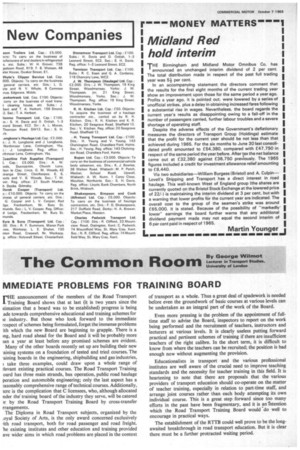By George Wil= ie t s The Common Room of London
Page 74

If you've noticed an error in this article please click here to report it so we can fix it.
Lecturer to" Transport ,
MMEDIATE PROBLEMS FOR TRAINING BOARD
rHE announcement of the members of the Road Transport Training Board shows that at last (it is two years since the Ltimation that a board was to be established) progress is being ade towards comprehensive educational and training schemes for Le industry. But those who look forward to the immediate mspect of schemes being formulated, forget the immense problems ith which the new Board are beginning to grapple. There is a Ing, hard road ahead for the Board and it will be probably more tan a year at least before any promised schemes are evident. Many of the other boards recently set up are building their new aining systems on a foundation of tested and tried courses. The aining boards in the engineering, shipbuilding and gas industries, ) take three examples, could draw upon a whole range of ;levant existing practical courses. The Road Transport Training oard has three main strands, bus operation, public road haulage peration and automobile engineering; only the last aspect has a ;asonably comprehensive range of technical courses. Additionally, tere is the complication that C licensees, who, although allocated nder the' training board of the industry they serve, will be catered r by the Road Transport Training Board by cross-transfer rrangements.
The Diploma in Road Transport subjects, organized by the .oyal Society of Arts, is the only award concerned exclusively ith road transport, both for road passenger and road freight. he existing institutes and other education and training provided ave wider aims in which road problems are placed in the context of transport as a whole. Thus a great deal of spadework is needed before even the groundwork of basic courses at various levels can be undertaken as an integral part of the work of the Board.
Even more pressing is the problem of the appointment of fulltime staff to advise the Board, inspectors to report on the work being performed and the recruitment of teachers, instructors and lecturers at various levels. It is clearly useless putting forward practical and pertinent schemes of training if there are insufficient teachers of the right calibre. In the short term, it is difficult to know from where the teachers can be recruited; the position is bad enough now without augmenting the provision.
Educationalists in transport and the various professional institutes are well aware of the crucial need to improve teaching standards and the necessity for teacher training in this field. It is heartening to note that there are proposals that the various providers of transport education should co-operate on the matter of teacher training, especially in relation to part-time staff, and arrange joint courses rather than each body attempting its own individual course. This is a great step forward since too many efforts in the past have been fragmentary, and it is anintention which the Road Transport Training Board would -do well to encourage in practical ways.
The establishment of the RTTB could well prove to be the longawaited breakthrough in road transport education. But it is clear there must be a further protracted waiting period.




















































































































